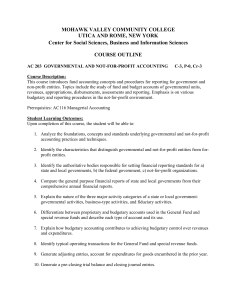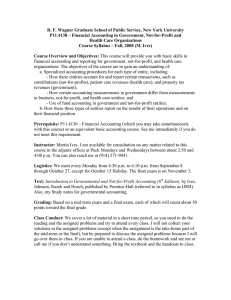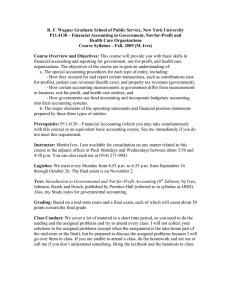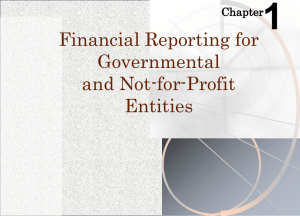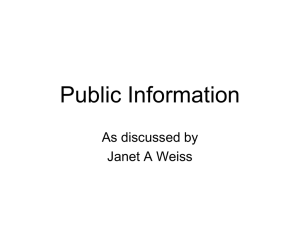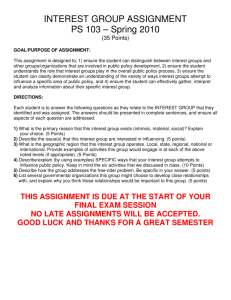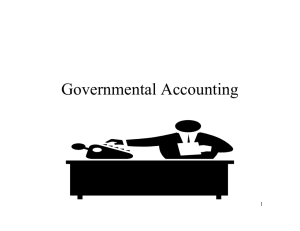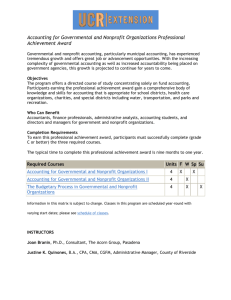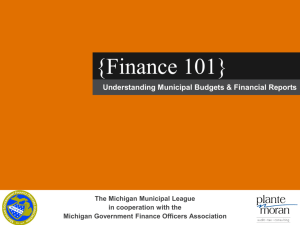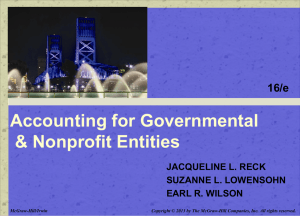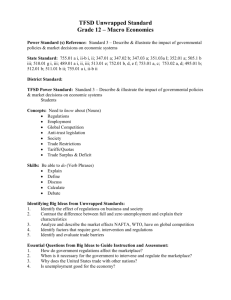Are You suprised - Prince Sultan University
advertisement
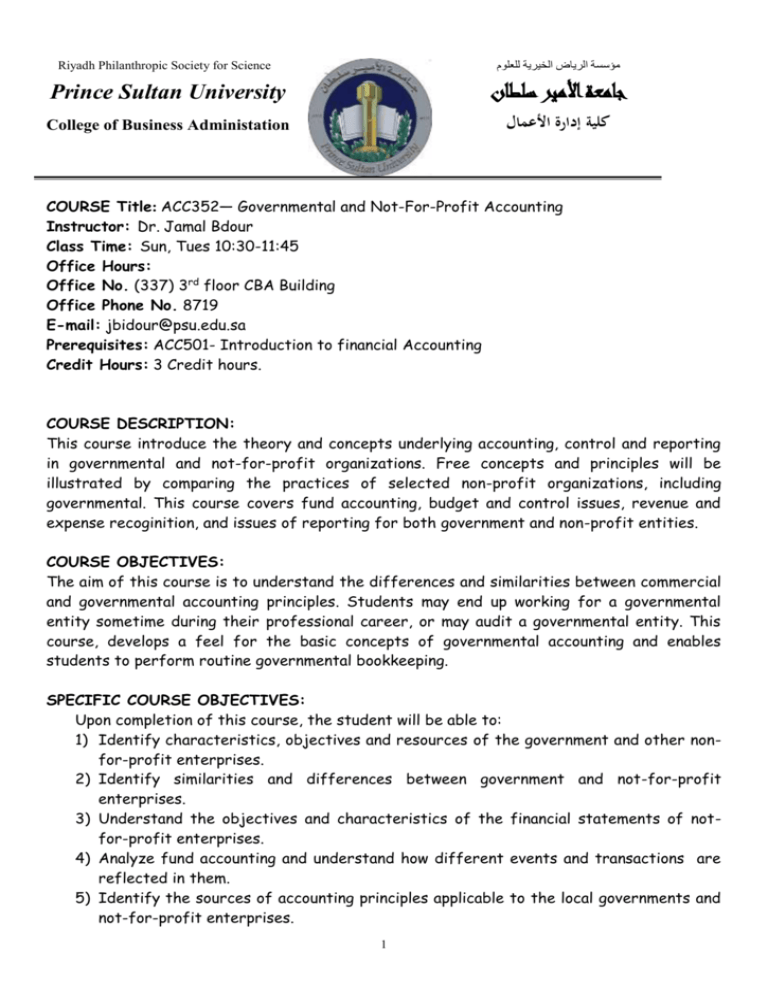
Riyadh Philanthropic Society for Science مؤسسة الرياض الخيرية للعلوم Prince Sultan University جامعة األمير سلطان كلية إدارة األعمال College of Business Administation COURSE Title: ACC352— Governmental and Not-For-Profit Accounting Instructor: Dr. Jamal Bdour Class Time: Sun, Tues 10:30-11:45 Office Hours: Office No. (337) 3rd floor CBA Building Office Phone No. 8719 E-mail: jbidour@psu.edu.sa Prerequisites: ACC501- Introduction to financial Accounting Credit Hours: 3 Credit hours. COURSE DESCRIPTION: This course introduce the theory and concepts underlying accounting, control and reporting in governmental and not-for-profit organizations. Free concepts and principles will be illustrated by comparing the practices of selected non-profit organizations, including governmental. This course covers fund accounting, budget and control issues, revenue and expense recoginition, and issues of reporting for both government and non-profit entities. COURSE OBJECTIVES: The aim of this course is to understand the differences and similarities between commercial and governmental accounting principles. Students may end up working for a governmental entity sometime during their professional career, or may audit a governmental entity. This course, develops a feel for the basic concepts of governmental accounting and enables students to perform routine governmental bookkeeping. SPECIFIC COURSE OBJECTIVES: Upon completion of this course, the student will be able to: 1) Identify characteristics, objectives and resources of the government and other nonfor-profit enterprises. 2) Identify similarities and differences between government and not-for-profit enterprises. 3) Understand the objectives and characteristics of the financial statements of notfor-profit enterprises. 4) Analyze fund accounting and understand how different events and transactions are reflected in them. 5) Identify the sources of accounting principles applicable to the local governments and not-for-profit enterprises. 1 6) Identify the objectives of the accounting principles and financial reporting of government and not-for-profit enterprises. 7) Analyze transactions that involve fund accounting. 8) Analyze the accounting involved in general fund revenues and expenditures. 9) Identify, analyze and make accounting entries for transactions involving the capital projects fund. 10) Identify, analyze and make accounting entries for transactions involving the debt service fund. 11) Identify, analyze and make accounting entries for transactions involving fixed assets in government and not-for-profit enterprises. 12) Identify and understand GASB requirements for determining the “reporting entity”. LEARNING OUTCOMES: After completing this course the students will be able to: 1. Compare and contrast reporting objectives of governmental and other non-profit organizations in contrast to those of commercail organizations. 2. Evaluate the major components of government annual financial reporting. 3. Analyze the theory and purpose of “fund accounting” and apply fund accounting principles in recording of governments and other non-profit organizations’ transactions. 4. Explain and apply the unique modified accrual basis of accounting used by governments. COURSE MATERIALS: Required Textbook: Granof and Wardlow, Core Concepts of Government and Not-For-Profit Accounting, Wiley , latest edition. Textbook Web Page: http://bcs.wiley.com/he-bcs/Books?action=index&itemId=047008734X&bcsId=3593 Or, www.wiley.com/college/granof Then select Student Companion Website ASSESSMENT: Class Participation Homework & Assignments First Exam Second Exam Final Examination 10% 10% 20% 20% 40% ADDITIONAL INFORMATION PARTICIPATION: It has been my experience that it is difficult to do well in this class without your regular attendance and active participation. You are expected to come to class (1) having read the assigned chapter and (2) having completed all assigned homework. An integral part of any successful business career is the ability to communicate ideas effectively. Since the classroom is one of the easiest forums in which to cultivate this talent, participation in classroom discussions is required 2 and expected. EXAMINATIONS: Student will be examined in the application. Exam questions may consist of multiple choice, short and long problems. You are responsible for all material covered in the text, readings, homework, or lectures. No make-up exams will be given. Absences result in grade of zero for that particular exam. Cheating is grounds for immediate class failure. IN-CLASS ASSIGNMENTS : This is a group assignments that will be issued during the semester in class, each group will be (2-3) students. All assignments will count 10 points for participation and attendance. TOPICS TO BE COVERED: Week -1: Chapter 1: The Government and Not-For-Profit Environmentand Characteristics: Governments and Not-For-Profits Organization. Governments and Not-For-Profits Entity Environment. Users and Users of Accounting Information. Accounting Principles and Standars. Objectives of Financial Reporting. Unique Accounting and Financial Reporting Characteristics. Week -2 and 3 : Chapter 2: The Use of Funds in Governmental Accounting: Fund Accounting. Measurement Focus and Basis of Accounting. What are the main types of governments’ funds. Governmental-type Funds. Properietary-Type Funds. Fiduciary-Type Funds. Week -4 and 5: Chapter 4: The Governmental Fund Accounting Cycle An Introduction to General and Special Revenue Funds Recognizing Revenues and Expenditures. Illustrating the General Fund Accounting Cycle. Control Accounts and Subsiduary Ledgers. Closing Comments. FIRST EXAM Week -6: Chapter 5: The Governmental Fund Accounting Cycle Additional Transactions to General and Special Revenue Funds-Introduction to permanenet Funds Property Tax Accounting. Accounting for Other Taxes and Intergovernmental Grants. 3 Important Exceptions to the general Principles for Recognizing Expenditures. Fund Balance Presentation. Interfund Activity Additional Aspects of Budgetary Accounting. Other Issues Review of Year-End Financial Statements. Permanent Funds. Week -7 qnd 8: Chapter 6: The Governmental Fund Accounting Cycle Capital Projects Funds, Debt Service Funds and Special Assessments. Measurement Focus and Basis of Accounting. Capital Projects Funds. Debt Service Funds. Week -9: Chapter 7: The Governmental Fund Accounting Cycle Proprietary-Type Funds Overview. Specific Aspects of Internal Service Funds. Specific Aspects of Enterprise Funds. SECOND EXAM Week -10: Chapter 8: The Governmental Fund Accounting Cycle Fiduciary Funds Overview of Employer Government pension Accounting. Fiduciary-Type Funds: Pension Trust Funds. Fiduciary-Type Funds: Investment Trust Funds. Fiduciary-Type Funds: Private Purpose Trust Funds. Fiduciary-Type Funds: Agency Funds. Week -11 and 12: Arabic supplements: المحاسبة الحكومية و إعداد الموازنة العامة في FINAL EXAM: Determined according to final exam schedule prepared by Registration Department HOMEWORK: A large number of homework problems will be assigned for each chapter. I will collect some homework and I will spend quite a bit of time doing example problems from among those assigned. I will give you advance notice in class of when I will collect selected problems. I plan on collecting about 6 homework problems and you will be able to drop the lowest. The problems will be graded primarily for effort and completeness. 4 CLASS ATTENDANCE: you are expected to attend all classes for this course, and you are fully responsible for learning the course content. Absences do not release you from this responsibility. CLASS PREPARATION: students desiring to master the material should read the textbook and complete all questions, exercises and problems at the end of each chapter. A review of completed exercises will not be sufficient preparation for examinations. Similar to mathematics accounting cannot be learned by reading & memorizing information. PARTICIPATION: It has been my experience that it is difficult to do well in this class without your regular attendance and active participation. You are expected to come to class (1) having read the assigned chapter and (2) having completed all assigned homework. An integral part of any successful business career is the ability to communicate ideas effectively. Since the classroom is one of the easiest forums in which to cultivate this talent, participation in classroom discussions is required and expected. EXAMINATIONS: You are responsible for all material covered in the text, readings, homework, or lectures. No make-up exams will be given. A student must submit in writing to the instructor concerned the reasons for the absence no later than three days as of the resumption of attendance. Unexcused absences result in grade of zero for that particular exam. Cheating is grounds for immediate class failure. EXAMS: The tentative exam schedule is that the exams will be given during the semester. If circumstances make it impossible for you to take a scheduled exam, it is your responsibility to contact me before the exam. In the event that the circumstances are judged to be reasonable, I will decide on an appropriate alternate solution. 5
